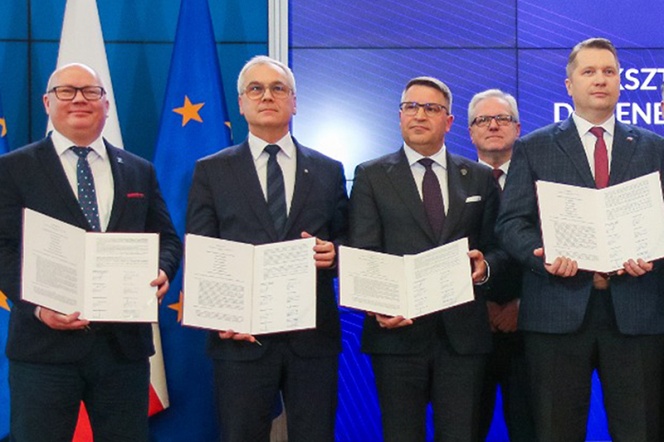Date added: 2023-02-02
Training staff for the nuclear power industry – signing a letter of intent

Cooperation of science and business for the development of nuclear energy in Poland
During the press conference, the Minister of Education and Science pointed out the need for cooperation between science and business, which is essential for mutual development. He emphasized that low-emission energy is one of the key challenges for the economy in Poland.
– The world of science must follow business, support business and entrepreneurship. Zero-emission energy, nuclear energy is the energy sector of the near future, pointed out the minister. – We will create a separate program for the development of nuclear energy, so that Poland will have not only engineers, but also world-leading scientists.
Signing the letter of intent
The main purpose of the signed letter is to develop an education program in the field of nuclear energy (NE) and to organize and launch first and second cycle studies with a general academic profile in this field from the academic year 2023/2024.
As the head of the Ministry of Education and Science emphasized, in the case of some universities it will be the reactivation of education in this field: - The agreement concerns the creation or reactivation, depending on the case, of the field of education in nuclear energy, where nuclear engineers will be educated.
The document was signed by:
- Przemysław Czarnek, Minister of Education and Science,
- President of the Management Board of PKN Orlen Daniel Obajtek,
- Rector of the Poznań University of Technology prof. Teofil Jesionowski, PhD, DSc, Eng.
- Rector of the Silesian University of Technology prof. Arkadiusz Franciszek Mężyk, PhD, DSc, Eng.
- Rector of Gdańsk University of Technology prof. Krzysztof Wilde, PhD, DSc, Eng.
- Rector of the Stanisław Staszic AGH University of Science and Technology in Krakow prof. Jerzy Lis, PhD, DSc, Eng.
- Rector of the Warsaw University of Technology prof. Krzysztof Zaremba, PhD, DSc, Eng.
- Rector of the Wrocław University of Science and Technology prof. Arkadiusz Kazimierz Wójs, PhD, DSc, Eng.
Small Modular Reactors (SMRs)
ORLEN Synthos Green Energy (an enterprise of PKN ORLEN and Synthos Green Energy) plans to build several dozen small nuclear reactors (SMRs) in Poland, which are to be built before the end of 2029. This challenge means searching for specialists who will be employed to work in power plants, but also earlier during their construction.
Each power plant with a BWRX-300 reactor creates about 100 jobs for highly qualified specialists. The lack of them would be a huge barrier to the development of the nuclear industry in Poland, especially of small SMR reactors, which will be built relatively quickly and will be deployed in many locations.
The new branch of industry will need not only nuclear specialists, but also chemists, electrical engineers, chemical technology specialists, security and environmental protection specialists, cybersecurity specialists, scientists, and crisis response services.
The implementation of OSGE's plans in the area of building the BWRX-300 fleet means at least several thousand jobs. Professionals educated thanks to the agreement do not have to worry about future employment and salaries. In the world, nuclear energy job market offers salaries about 20-30 percent higher than the conventional energy segment.
Construction of the first reactor is scheduled to begin in 2026, commissioning in 2033, and commissioning of the last reactor in the second power plant in 2043. Educating specialists in this field is one of the most important challenges for the development of nuclear energy in Poland.
Staff for modern economy
One of the priorities of the Ministry of Education and Science is to inspire universities to create new fields of study that will respond to the needs of the changing labor market and contribute to the development of the Polish economy. Appropriate financing and cooperation with the socio-economic environment are crucial in this aspect.
– Gdańsk University of Technology has many years of experience in educating specialized staff for the nuclear industry, hence we are now returning to the "nuclear power" specialization in the field of power engineering - says prof. Krzysztof Wilde, Rector of Gdańsk Tech. - We are also planning to create other dedicated educational paths in this area, i.e. postgraduate or master's studies. We also periodically open research centers where our scientists carry out projects and prepare expert opinions for companies from various industries. We are currently preparing to open the Gdańsk Tech Nuclear Energy Center, thanks to which we will have an even greater impact on the economic development of our region.
The signing of the letter of intent took place at the Ministry of Education and Science on 31 January 2023.
-
2026-01-12
Turning seawater into green fuel

